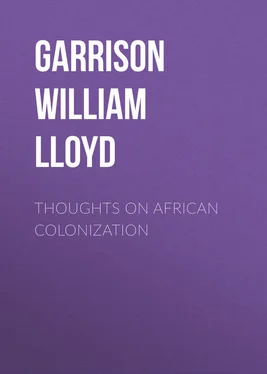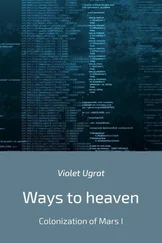William Garrison - Thoughts on African Colonization
Здесь есть возможность читать онлайн «William Garrison - Thoughts on African Colonization» — ознакомительный отрывок электронной книги совершенно бесплатно, а после прочтения отрывка купить полную версию. В некоторых случаях можно слушать аудио, скачать через торрент в формате fb2 и присутствует краткое содержание. Жанр: История, foreign_antique, foreign_prose, на английском языке. Описание произведения, (предисловие) а так же отзывы посетителей доступны на портале библиотеки ЛибКат.
- Название:Thoughts on African Colonization
- Автор:
- Жанр:
- Год:неизвестен
- ISBN:нет данных
- Рейтинг книги:4 / 5. Голосов: 1
-
Избранное:Добавить в избранное
- Отзывы:
-
Ваша оценка:
- 80
- 1
- 2
- 3
- 4
- 5
Thoughts on African Colonization: краткое содержание, описание и аннотация
Предлагаем к чтению аннотацию, описание, краткое содержание или предисловие (зависит от того, что написал сам автор книги «Thoughts on African Colonization»). Если вы не нашли необходимую информацию о книге — напишите в комментариях, мы постараемся отыскать её.
Thoughts on African Colonization — читать онлайн ознакомительный отрывок
Ниже представлен текст книги, разбитый по страницам. Система сохранения места последней прочитанной страницы, позволяет с удобством читать онлайн бесплатно книгу «Thoughts on African Colonization», без необходимости каждый раз заново искать на чём Вы остановились. Поставьте закладку, и сможете в любой момент перейти на страницу, на которой закончили чтение.
Интервал:
Закладка:
'The specific object to which the entire funds of the Institution are devoted, is simple and plainly unexceptionable in this respect, that it interferes with no rights of individuals, and with no law of the land.' * * * 'It embraces in its provisions only the free. It does not interfere – it desires not to interfere, in any way, with the rights or the interests of the proprietors of slaves. It condemns no man because he is a slaveholder ; it seeks to quiet all unkind feelings between the sober and virtuous men of the North and of the South on the subject of slavery; it sends abroad no influence to disturb the peace, and endanger the security and prosperity of any portion of the country.' – [Character and Influence of the Colonization Society. – African Repository, vol. vii. pp. 194, 200.]
'Can it be a ruthless scheme of political speculation, which would trample, with rude and unhallowed step, upon the rights of property, to gratify the visionary and fanatical projects of its authors? No: this is impossible. Yet such is the language of intemperate opposition, with which this Society has been assailed by its enemies.' * * * 'Equally absurd and false is the objection, that this Society seeks indirectly to disturb the rights of property, and to interfere with the well-established relation subsisting between master and slave. The man who avows such monstrous purposes as these, and seeks to shelter himself under the sanction and authority of the American Colonization Society, is a base traitor to the cause which it seeks to advance – AN ENEMY OF THE WORST AND MOST DANGEROUS STAMP, because he assumes the specious garb of a friend and coadjutor. Let him stand, or let him fall, by the verdict of an insulted and outraged community – but do not make liable for his acts a great Institution, whose real friends will be the first to reject and discountenance him, and to mark upon his forehead in indelible characters, "This is a traitor to the cause of his country and the cause of humanity." – It is true that the friends of the American Colonization Society have permitted themselves to entertain the high and exalted hope, that, by its influences, ultimate and remote, the burdens which are incident to slavery may be greatly mitigated, and possibly the evil itself at some future day be entirely removed. But mark, Mr President, and mark well, ye hearers, the grounds upon which this hope is founded. It could not be sustained by any effort, direct or indirect, to invade the rights of the slaveholding community, for the plain and palpable reason, that the effort itself would furnish the most certain means of defeating the object in view, even supposing the friends of the Society reckless enough to entertain it. It would denote on the part of those who made it, an extremity of madness and folly, wholly unprecedented in the history of the world, and if persevered in, would dissolve the government into its original elements, even though the principle of union which holds it together were a thousand-fold stronger than it is.' * * * 'Surely the friends of the Colonization Society have done nought either to alarm the honest fears of the patriot, or excite the morbid sensibilities of the slaveholder.' – [Address delivered before the Lynchburg Auxiliary Colonization Society, August 18, 1831.]
'While, therefore, they determined to avoid the question of slavery , they proposed the formation of a colony on the coast of Africa, as an asylum for free people of color.' * * * 'The emancipation of slaves or the amelioration of their condition, with the moral, intellectual, and political improvement of people of color within the United States, are subjects foreign to the powers of this Society .' – [Address of the Board of Managers of the American Colonization Society to its Auxiliary Societies. – African Repository, vol. vii. pp. 290, 291.]
'The American Colonization Society was formed with special reference to the free blacks of our country. With the delicate subject of slavery it presumes not to interfere. And yet doubtless from the first it has cherished the hope of being in some way or other a medium of relief to the entire colored population of the land. Such a hope is certainly both innocent and benevolent. And so long as the Society adheres to the object announced in its constitution, as it hitherto has done, the master can surely find no reasonable cause of anxiety. And it is a gratifying circumstance that the Society has from the first obtained its most decided and efficient support from the slaveholding States .' – [Sermon, delivered at Springfield, Mass., July 4th, 1829, before the Auxiliary Colonization Society of Hampden County, by Rev. B. Dickinson.]
'The American Colonization Society in no way directly meddles with slavery. It disclaims all such interference.' – [Correspondent of the Southern Religious Telegraph.]
'This system is sanctioned by the laws of independent and sovereign states. Congress cannot constitutionally pass laws which shall tend directly to abolish it. If it ever be abolished by legislative enactments, it must be done by the respective legislatures of the States in which it exists. It never designed to interfere with what the laws consider as the rights of masters – it has made no appeals to them to release their slaves for colonization, nor to their slaves to abandon their masters. With this delicate subject, the Society has avowedly nothing to do. Its ostensible object is necessarily the removal of our free colored population.' – [Middletown (Connecticut) Gazette.]
'With slaves, however, the American Colonization Society has no concern whatever, except to transport to Africa such as their owners may liberate for that purpose.' – [Oration delivered at Newark, N. J., July 4th, 1831, by Gabriel P. Disosway, Esq.]
'It disclaims, and always has disclaimed, all intention whatever, of interfering in the smallest degree, direct or indirect, with the rights of slaveholders, the right of property, or the object of emancipation, gradual or immediate. It knows that the owners of slaves are the owners, and no one else – it does not, in the most remote degree, touch that delicate subject . Every slaveholder may, therefore, remain at ease concerning it or its progress or objects.' – [An advocate of the Society in the New-Orleans Argus.]
It were needless to multiply these extracts. So precisely do they resemble each other, that they seem rather as the offspring of a single mind, than of many minds. A large majority of them come in the most official and authoritative shape, and their language is explicit beyond cavil.
Here, then, is a combination, embracing able and influential men in all parts of the country, pledging itself not only to respect the system of slavery, but to frown indignantly upon those who shall dare to assail it. And what is this system which is to be held in so much reverence, and avoided with so much care? It is a system which has in itself no redeeming feature, but is full of blood – the blood of innocent men, women and children; full of adultery and concupiscence; full of darkness, blasphemy and wo; full of rebellion against God and treason against the universe; full of wrath – impurity – ignorance – brutality – and awful impiety; full of wounds and bruises and putrefying sores; full of temporal suffering and eternal damnation. It is, says Pitt, a mass, a system of enormities, which incontrovertibly bid defiance to every regulation which ingenuity can devise, or power effect, but a total extinction; a system of incurable injustice, the complication of every species of iniquity, the greatest practical evil that ever has afflicted the human race, and the severest and most extensive calamity recorded in the history of the world. Fox calls it a most unjust and horrible persecution of our fellow creatures. The Rev. Dr. Thomson declares it is a system hostile to the original and essential rights of humanity – contrary to the inflexible and paramount demands of moral justice – at eternal variance with the spirit and maxims of revealed religion – inimical to all that is merciful in the heart, and holy in the conduct – and on these accounts, necessarily exposed and subject to the curse of Almighty God. It is, says Rowland Hill, made up of every crime that treachery, cruelty and murder can invent. Wilberforce says, it is the full measure of pure, unmixed, unsophisticated wickedness; and scorning all competition or comparison, it stands without a rival in the secure, undisputed possession of its detestable pre-eminence. In this country, slavery is a system which leaves the chastity of one million females without any protection! which condemns more than two millions of human beings to remediless bondage! which authorises their sale at public vendue in company with horses, sheep and hogs, or in a private manner, at the pleasure of their owners! which, under penalty of imprisonment, and even death, forbids their being taught the lowest rudiments of knowledge! which, by the exclusion of their testimony in courts, subjects them to worse than brutal treatment! which recognizes no connubial obligations, ruthlessly severs the holiest relations of life, tears the scarcely weaned babe from the arms of its mother, wives from their husbands, and parents from their children! But who is adequate to the task of delineating its horrors, or recording its atrocities, in full? Who can number the stripes which it inflicts, the groans and tears and imprecations which it extorts, the cruel murders which it perpetrates? or who measure the innocent blood which it spills, or the degradation which it imposes, or the guilt which it accumulates? or who reveal the waste of property, the perversion of intellect, the loss of happiness, the burial of mind, to which it is accessary? or who trace its poisonous influence and soul-destroying tendency back for two hundred years down to the end of time? None – none but God himself! It is corrupt as death – black as perdition – cruel and insatiate as the grave. To adopt the nervous language of another: – The thing I say is true. I speak the truth, though it is most lamentable. I dare not hide it, I dare not palliate it; else the horror with which it covereth me would make me do so. Wo unto such a system! wo unto the men of this land who have been brought under its operation! It is not felt to be evil, it is not acknowledged to be evil, it is not preached against as evil; and, therefore, it is only the more inveterate and fearful an evil. 9 9 The term evil is used here in a criminal sense. I know that colonizationists regard slavery as an evil; but an evil which has been entailed upon this land, for the existence of which we are no more to blame than for the prevalence of plague or famine.
It hath become constitutional. It is fed from the stream of our life, and it will grow more and more excessive, until it can no longer be endured by God, nor borne with by man.
Интервал:
Закладка:
Похожие книги на «Thoughts on African Colonization»
Представляем Вашему вниманию похожие книги на «Thoughts on African Colonization» списком для выбора. Мы отобрали схожую по названию и смыслу литературу в надежде предоставить читателям больше вариантов отыскать новые, интересные, ещё непрочитанные произведения.
Обсуждение, отзывы о книге «Thoughts on African Colonization» и просто собственные мнения читателей. Оставьте ваши комментарии, напишите, что Вы думаете о произведении, его смысле или главных героях. Укажите что конкретно понравилось, а что нет, и почему Вы так считаете.












